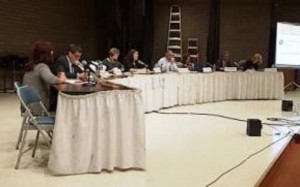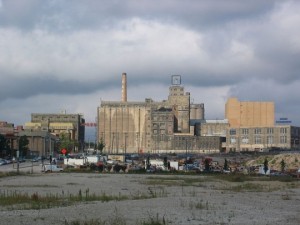Podcast: Play in new window | Download
Updates:
- PFCJ Challenge Sidewalk Arrests During Occupy Wall Street Anniversary
- Insane Clown Posse To Sue The FBI
- Texas Policeman Shoots Wheelchair Bound Man In The Head
———–
ACLU Issues Statement In Response to Father-Daughter Dance Controversy
In Rhode Island, the Cranston School Department recently announced that it is banning traditional “father-daughter” and “mother-son” activities. citing a violation of federal law. The controversy arose when a local parent-teacher organization with support from the school, organized a “father-daughter” dance for female students and a “mother-son” outing to a Pawtucket Red Sox baseball game. When a single mother complained that her daughter could not attend the dance because her father was not a part of their life, the ACLU notified the school district they were suing for gender discrimination under Rhode Island law. The Rhode Island ACLU posted a statement noting that “This type of gender stereotyping only perpetuates outdated notions of ‘girl’ and ‘boy’ activities and is contrary to federal law.”
- Title IV is a federal law, a really crucial law promoting fairness and equality on the basis of gender in the school setting.
- There are certain exemptions, one in particular says its ok for schools to have father-son and mother-daughter events without violating this general ban on sex discrimination in school activities.
- Back in the 1980s, Rhode Island passed its own version of Title IV.
- In April or May of this year, we did receive a complaint from a parent, a single mother who has a daughter in the Cranston School district, and she received a notice of a “Me and My Guy Dinner Dance” for girls attending the school.
- There is no adult male in her life, she’s raised her daughter by herself. When she got this notice she was concerned that she wouldn’t be able to attend. She was also concerned about the mothers and sons event, she was barred from that as well.
- She also pointed out that the PTO was reverting to an old type of tradition that they’d actually stopped a few years previously. Nonetheless the PTO said we want to bring back this father-daughter dance and that’s what we’re doing.
- We very quickly got a letter back from the superintendent not only agreeing with us, but they notified the PTOs previously that they should not be holding these types of events.
- It was a rogue PTO president deciding to bring back this father-daughter dance after it had disappeared for some time. We thought that it was all resolved, until a candidate for state office in Cranston decided to turn it into a political issue.
- If their name (ACLU clients) were out there (in the public) based on what we’ve seen here, I would expect based on some of the vitriol we’ve seen here but also vitriol we’ve experienced in another case in the same school district, that there would be some adverse consequences.
Guest – Attorney Steven Brown, Executive Director of the Rhode Island Civil Liberties Union.
———
Wisconsin Dept of Transportation And Federal Civil Rights Violations
The Federal Highway Administration’s Office of Civil Rights is moving to hold Wisconsin transportation officials accountable for allegedly discriminated against minorities. Though the state says it’s in compliance, a lawsuit proceeds on the legal basis of Title VI of the Civil Rights Act of 1964 which prohibits agencies that receive federal funds from discriminating on the basis of race, color, national origin, gender, age or disability. The lawsuit could freeze construction on a major Wisconsin freeway interchange known as the Zoo Interchange. Meanwhile, the ACLU of Wisconsin and the Black Health Coalition of Wisconsin continue to issue complaints that the Wisconsin DOT has allegedly failed to address their requirements to gather data about the impact their actions have on minorities.
Attorney Kayrn Rotke:
- Title VI – If you get federal money you can’t discriminate on the basis of race.
- Most if not all federal agencies have civil rights offices or units or divisions that enforce those Title VI requirements.
- It prohibits actions that have a discriminatory effect.
- Milwaukee and the counties around it are the most racially segregated region in the United States.
- The other issue if you have job growth in these overwhelmly white suburbs and absolutely no transit access.
- Its making a transportation system that benefits commuters who are disproportionally white.
- At the same time the transit system is biting the dust.
- We see that as a program that is clearly having a discriminatory effect on people of color.
- I think there are hooks that you can look at to try to challenge this.
- State Departments of Transportation have to update Title VI annually.
- This is taking a step back and looking at it in an environmental justice way.
- You can’t have healthy people in a sick community.
Guest – Karen Rotke, senior staff attorney for the ACLU of Wisconsin.
———
The Democrats: A Critical History
As we near the 2012 Presidential election, many are complacent about what they see as having to choose between the lesser of two evils. By choosing political heads of the false left right political paradigm, where third party candidates are marginalized, sidelined or altogether pushed out or sidelined what are are we really supporting? We talk today with author Lance Selfa, who wrote the book The Democrats: A Critical History. It offers a realistic assessment of the Democratic Party and examines the nature of the party beyond the campaign rhetoric and media hype. Lance joins us today to talk about his book, the Democratic Party and the upcoming election.
- I would describe it as one of the two big business parties that runs the American political system that trades off between itself and the Republican Party.
- Though many people don’t see it that way because it has the image of the party of the people. It’s the party that most African-Americans vote for, union members voter for.
- Really what controls it is big business interest.
- It was the party that tied together and held the southern slave holding class with northern financial interest and western farming interest.
- The Democratic Party combined the sense in which it was looked on as the party of social security and medicare and so on, but that was always coupled with commitment of the Democratic Party of an aggressive foreign policy that actually got us into wars like Vietnam.
- There’s a real bipartisan commitment to that empire.
- Both of them Republicans and Democrats answer to big business interests.
- The way Wall Street money is shifting support to Romney shows that business tries to play both parties to insure it’s interests are preserved.
- The Democrats are sort of like the “plan B” party for capital.
- Capital would prefer to have a party that’s just big business that doesn’t have to make any attempt to say that they’re in favor of any kind of programs for the poor.
- The Democrats at least have those rhetorical commitments. They have a social base that they have to placate.
- Business finds out in periods such as the end of the Bush Administration, the most unpopular administration since Richard Nixon that Republicans were going to get turfed out of office so business starts to move their money over to Democrats.
- If one succumbs to the idea that there are only two choices and the only thing anyone can do politically is to choose the lesser of two evils. Will voting for Obama actually advance an agenda of social movement? I would argue no.
Guest – Lance Selfa, author of The Democrats: A Critical History. Lance is a frequent contributor to the International Socialist Review, and writes a column on U.S. politics in Socialist Worker newspaper.
—————————————————————





